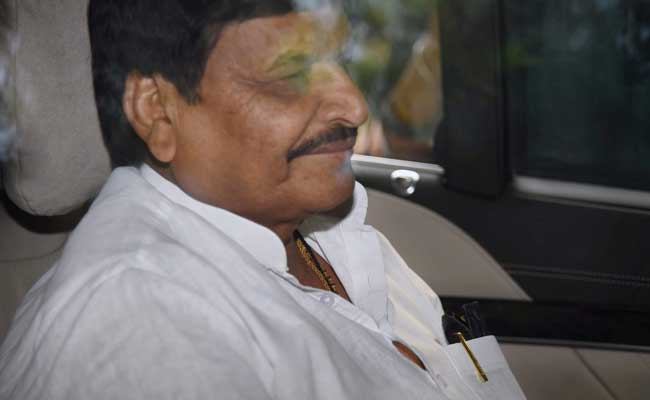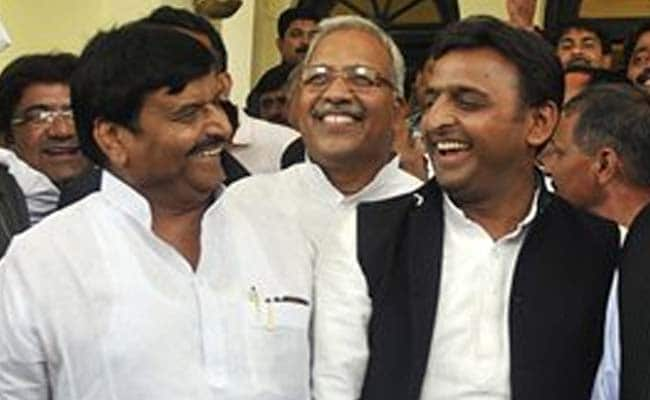Print journalists have been scouring Shakespeare's works to find interesting descriptions for the family feud raging in UP's pre-eminent Yadav family. What began with Much Ado about Nothing went on to be A Midsummer Night's Drama (not dream) and finally closed with All's Well that Ends Well on Saturday, September 17. But have things indeed ended well?
On the face of it, a deal has been struck between the protagonists to revert to the status quo that existed prior to the Mahabharat which broke out about a week ago. Even as revelry progressed at a party in Delhi thrown by Amar Singh who recently re-entered the Samajwadi Party, all hell was breaking loose in Lucknow.
That UP's ruling party is riven by filial dissensions is hardly "breaking news". Perhaps it is the only major political party which is run entirely by one clan with Mulayam Singh Yadav, a doughty former wrestler, as the patriarch. Therefore, their public bickerings have routinely caused merriment among observers who often get confused as to which brother is fighting which uncle, rather, which Yadav is confronting which Yadav!
Apart from the main dramatis personae, that is Mulayam Singh, his son and UP Chief Minister Akhilesh and brother Shivpal, the extended family includes Mulayam's cousin Ram Gopal, Prateek, step-brother to Akhilesh and the wives of the two sons, MP Dimple and prospective MLA Aparna respectively. Akhilesh has been steadily sought to be isolated in the party by uncle Shivpal, evidently with Mulayam's covert backing. While former teacher Ram Gopal is seen as a soft-spoken backroom boy who often plays peacemaker in family feuds, Shivpal is an aggressive leader who has helped Mulayam mould SP into a formidable political organization. Shivpal has been dismissive of Akhilesh all along, unable to deal with the young Chief Minister's sophistication and overt dislike of lawless elements allegedly patronized by his uncle.

Shivpal is an aggressive leader who helped Mulayam mould SP into a formidable political organisation.
Although a new generation in UP has tried to rise above caste considerations, the popular base of all major parties in the state is still in the custody of caste combines. While the SP is regarded as their own party by Yadavs and Mayawati primarily represents Dalits, the BJP retains its upper caste and non-Yadav OBC base. The Congress has declined too precipitously to command any significant vote bank apart from a smattering of Brahmins in a few pockets.
Like his fellow Mandalite leader (now connected by matrimonial ties too) Laloo Yadav of Bihar, Mulayam once commanded the unswerving support of Muslims, who at 19 per cent of the state's population can determine UP's electoral outcome, except on occasion. In 2014, for example, the BJP, riding the crest of the Modi wave swept the state with 71 (out of 80) Lok Sabha seats, overcoming Muslim resistance. In a state election, however, there is unlikely to be any overwhelming political sway, nor will caste combinations be dented.
Knowing that Akhilesh has to garner the Yadav vote and the community regards "Netaji" Mulayam as its supreme leader, Uncle Shivpal evidently decided to go for broke to retain the Old Guard's control over the party before the distribution of party nominations for the forthcoming election. They needed to claw back their authority at which Akhilesh was steadily chipping away. If the Chief Minister managed to win a second successive election, they must have reasoned, it would be time to write the Yadav Old Guard's political obituary. Shivpal took on his nephew believing that Mulayam was not fully comfortable with his son's style of functioning. Akhilesh, in turn, fired the first salvo against Shivpal, confident that his father would not dump him despite his periodic public expressions of unhappiness.

Akhilesh Yadav has gained significantly from this round of blood-letting.
There is not an iota of doubt that the Samajwadis' future rests on the shoulders of Akhilesh and his generation. Inner-party intrigue, late night confabulations and the politics of back-stabbing have become characteristic of a tired and rejected past. Yet Akhilesh is still to gain the degree of control over the party that would allow him an unfettered run. Even though he has stepped back and allowed his father to broker a tenuous peace, he cannot allow his rivals to gain the upper hand. Sooner rather than later, the Chief Minister will have to assert himself again and seize the reins of the party from Shivpal, with or without Mulayam's backing.
But image-wise, Akhilesh has gained significantly from this round of blood-letting. For the first time, he has emerged as a leader in his own right, capable of taking on his critics in the face of his father's unhappiness. Mulayam knows an election cannot be won with the Old Guard in the forefront no matter how useful they may have been to him in the past. The challenge before Akhilesh is not to lose the goodwill he has generated across the state through his development-oriented politics, while at the same time retaining his party's core support base among the Yadavs.
Akhilesh's assets are two-fold: first, time is on his side and second, everybody loves a winner. But to deepen his support base and build an aura, he has to vanquish his opponents - ironically all within his family - fully and finally.
(Dr. Chandan Mitra is a journalist, currently Editor of The Pioneer Group of Publications. He is also BJP MP of the Rajya Sabha.)
Disclaimer: The opinions expressed within this article are the personal opinions of the author. The facts and opinions appearing in the article do not reflect the views of NDTV and NDTV does not assume any responsibility or liability for the same.


